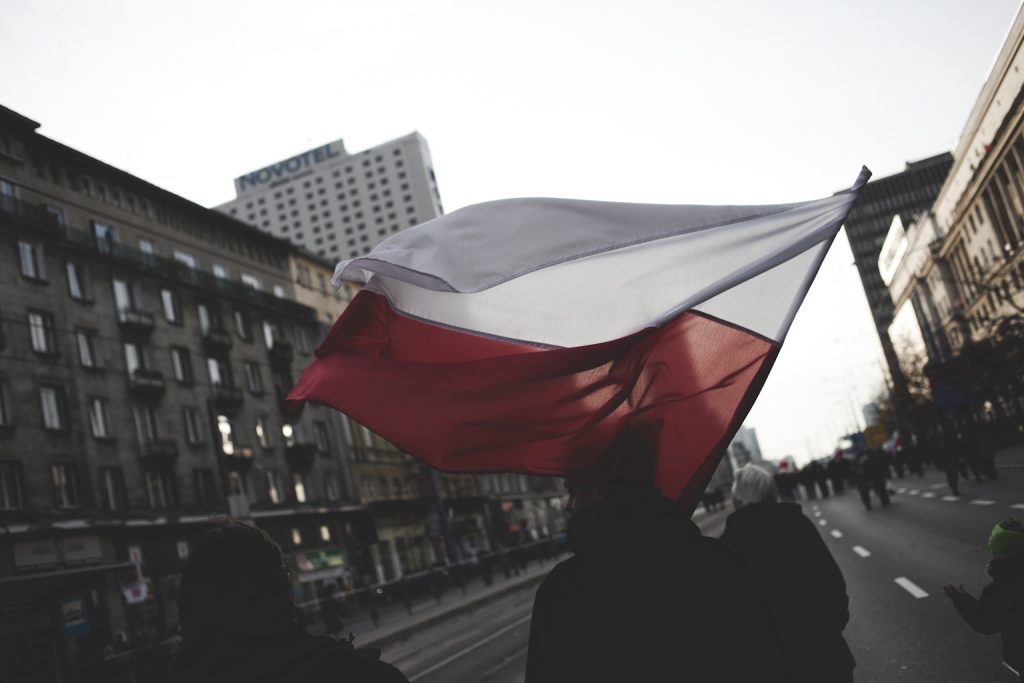It’s not the economy, stupid! Explaining the success of authoritarian populism in Poland
By Dr Jacek Kucharczyk.

In this article I argue that — contrary to prevailing wisdom — the rise of authoritarian populism in Poland, culminating with the electoral triumph of the Law and Justice (Prawo i Sprawiedliwość — PiS) party in 2015, and the subsequent drift towards authoritarianism, cannot be fully accounted for by economic inequalites and the discontents of the “left behind” of Poland’s transformation from state socialism to market economy. Instead, I agree with Pippa Norris, who argues that populist authoritarianism ”can best be explained as a cultural backlash in Western societies against long-term, ongoing social change”[1]. In this vein, I argue that the driving forces of Poland’s populist upheaval are nativism, political Catholicism, and fear of Muslim refugees. Thus, the rise to power of authoritarian populists in Poland is better understood as a backlash against open society values and against parts of the politcal and cultural elites which are believed to represent these values. I further explain how the Law and Justice party has exploited this backlash by mobilizing its support base and demobilizing support for its competitors, ensuring its leading position on the political scene, despite protests and widespred domestic opposition to its policies. [2]
The “conservative” backlash
The contemporary rise of populist parties and movements is often attributed to a revolt of those left behind by economic globalization. In other words, populism is seen as a response to growing social inequality, as a by-product of the neoliberal “Washington consensus” that rose to prominence after 1989, and as a reaction to the financial and economic crisis of 2008. This explanation seems plausible in view of the fact that populism often draws support from the less affluent and less educated sections of society, especially men, whose economic position has become precarious in the globalized post-industrial economy. However, a growing body of research points out that this theory of the “mobilization of the dispossessed” has limited explanatory power.[3] On the contrary, the rise of authoritarian populism should be seen as a reaction to the liberal societal changes in recent decades.
Following Poland’s accession to the EU, many ideas and policies, once promoted by relatively marginal groups of feminist and LGBT activists, have become mainstreamed even if they not always have been transtalated into legislation (i.e mariage equality). In spite of the fact that most Poles formally remained members of the Roman Catholic Church, studies showed growing social and political divide along moral-cultural rather than socio-economic issues. “The silent revolution” in social values, which started in Western societies during the 1970s, came to Central Europe much later and has evoked strong adversarial reactions among the more traditional sections of society, backed by the hierarchy of the Catholic church.[4]
Although the PiS was elected on a ticket of generous socio-economic promises, its position as an unchalleged leader on the right of the polical spectrum after years in the opposition came from its strong profile on identity and sovereignty issues as well as its deep alliance with the Polish Catholic church. Indeed, as this study, conducted on the eve of the 2015 elections, demonstrates, the declared intentions to vote for the PiS party strongly correlated with strong views on issues of morality and identity, including religiosity, opposition to abortion and to deeper European integration.
Last but not least, the refugee crisis, and especially the controversial policy of the European Commission for mandatory quotas of Syrian refugees for each member state, brought about an upsurge of xenophobia, which has been actively encouraged by the PiS politicians and government-controlled media. One recent example of this is a tweet from the party’s official account: ”Don’t let them tell you that aversion to refugees is something wrong”[5]. It well illustrates that the party not just seeks support from voters who share their xenophobic and islamopobic views, but provides its supporters with a kind of moral justification. Hating migrants becomes an act of patriotism or even defense of the ”Christian civilization”.
The refugee crisis and its (negative) resonance in the Polish society has added anti-immigration and anti-refugee sentiment to the Polish populist’s ideological toolbox. It also allowed the PiS to whip-up negative sentiments towards Germany and the European Union[6], making the Polish brand of populism rather similar to that of its West European counterparts[7].
Mobilization and demobilization of voters
Although the PiS — like all populist parties — claims to represent the “people” against the elites, it is highly debatable whether it has ever represented a majority of the Polish public. The Law and Justice party won the parliamentary elections with just 37.8% of the total vote. The electoral turnout of just above 50% means that the PiS secured a narrow majority of votes with the support of just 18.6% of eligible voters, showing it owes its majority of seats to a demobilized public and the failure of left wing parties to cross the electoral threshold of 5%. Until 2017 the PiS further consolidated its majority by attracting a number of MPs from the anti-establisment Kukiz’15 grouping and exploiting the majority to pass a series of laws: dismantling key democratic checks and balances, including an independent judiciary, a professional civil service, and (independent) public media.[8]
Kaczyński’s party’s victory was possible through the creation of a highly effective “anger industry”, which fed on and amplified both prejudices and discontents of different social groups and individuals.[9] The right-wing media, both traditional and online, contributed to the creation of a “parallel reality”, where indignation at real and imaginary injustices and political malpractices was channeled against the purportedly intolerable status quo. While the villification of the elites served to whip up resentment among potential supporters, a parallel campaign was launched to convince undecided voters that Law and Justice was a normal conservative party, more competent than the incumbement and no threat to the stability of Polish democracy or European norms and values. Those warning about the PiS’s authoritarian and populist tendencies were ridiculed and branded as agents of the “status quo”. The same practice of mobilizing core supporters and demonizing opponents (memorably described as “Poles of the worst sort” and “tracherous faces” by PiS leader, Jarosław Kaczyński) continued after the PiS took over government — but with far greater resources at its disposal, including the public media.
Despite their controversial and divisive policies after two years in office, the support for the ruling Law and Justice party exceeds 40% of declared voters, more then 10 percentage points ahead of the two strongest opposition parties (Civic Platform and Modern Poland). If one considers declared absentees and undecided voters, support for the ruling party does not exceed one-third of the eligible citizenry. This last figure is consistent with the results of the survey conducted in October 2017, which coincided with the protests around the so-called “judiciary reform”.[10] This study showed that while 35% of the respondents declared support for the PiS changes of the functioning of key democratic institutions, half of those polled are opposed to them, including 32% ” strongly opposed”[11]. However, this declared opposition of a substantive part of the society is not translated into their support for the opposition parties. Indeed a vast majority of respondents in the same survey declare distrust of all political parties. Such generalized distrust of politics and political parties has been a feature of Polish political life, resulting in a consistently low electoral turnout. Another study conducted in the aftermath of the judiciary protests demonstrated how well the government propaganda can explore this generalized aversion to politics and political parties to demobilize the opponents of populists policies by branding opposition parties as demoralized, corrupt, and greedy for power; thus effectively undermining the opposition’s narrative that the PiS government is a threat to democracy. [12]
Conclusions – countering the backlash against an open society
Understanding the complexities of populism’s appeal is necessary in order to find effective ways to reverse the populist upsurge or to resist the destruction of institutions and societal norms when populists are in power. Framing populism in narrow socio-economic categories and depicting populist voters as “victims of globalization” naturally puts emphasis on fixing social policies towards greater social inclusion, which is desirable in itself but hardly effective as far as undercutting the support for right wing authoritarian populism goes. For one thing, it is difficult to outbid populists in their promises of unrestricted spending and other socially popular but irresponsible policies (such as lowering the retirement age in Poland).
As was asserted in this essay, populism is a backlash against progressive and liberal social values and needs to be confronted directly by mobilizing those groups and social actors who are directly or indirectly threatened by populist policies, such as women and minorities. The power of the so-called “black protest” against the government’s assault on women’s rights is one good example of such social mobilization. Secondly, civil society groups and non-populist politicians need to reclaim social media and learn to challenge populism in the area of social communication. Thirdly, and most importantly, street protests, marches, and petitions will not by themselves defeat entrentched populists. Their defeat can only come through the ballot box. This means that countering any anti-populist backlash against an open society can only be effective if different groups and civil society organizations, as well as individuals, overcome their aversion to politics and translate their energy into effective political action.
–
Dr Jacek Kucharczyk is President of the Institute of Public Affairs, one of Poland’s leading think-tanks.
Disclaimer
The views and opinions expressed in this article are those of the author.
–
[1] Norris, Pippa, “It’s not just Trump. Authoritarian populism is rising across the West. Here’s why”, The Washington Post (11 March 2016).
[2] For a more detailed analysis of the Polish case, including the socio-economic factor, see J. Kucharczyk et al. “When fear wins: causes and consequences of Poland’s populist turn” [in:] Nothing to Fear but Fear Itself. Mapping and responding to the rising culture and politics of fear in the European Union, DEMOS 2017, pp. 305–362.
[3] Inglehart, Roland, Norris, Pippa, “Trump, Brexit, and the Rise of Populism: Economic Have-Nots and Cultural Backlash”, Faculty Research Working Paper Series, August 2016.
[4] See: Druciarek, Małgorzata, „Social conservatism and the cultural backlash in Poland“ in Kucharczyk, et al., “When fear wins”, op. cit., pp. 338–335.
[5] The tweet was later replaced by a more neutral one, the original can still be found here.
[6] For a more detailed analysis of the impact of the refugee crisis and the relations between the PiS government and the EU, see “New Pact for Europe – National Report – Poland”.
[7] Zack Beauchamp, “White riot. How racism and immigration gave us Trump, Brexit, and a whole new kind of politics”, 20 January 2017 (accessed on 26 June 2017).
[8] See J. Fomina, J. Kucharczyk “Populism and Protest in Poland” [in:] Journal of Democracy, October 2016, Volume 27, Number 4, p. 58–68
[9]Maciej Gdula, Dobra zmiana w Miastku, http://krytykapolityczna.pl/file/sites/4/2017/10/Dobra-zmiana-w-Miastku.pdf
[10] For my account of the protests see: https://www.huffingtonpost.com/entry/poland-right-wing-protest_us_597b714fe4b02a4ebb754ca5?section=us_theworldpost
[11] http://www.isp.org.pl/uploads/filemanager/PR/JakimiobywatelamisamieszkancyCEE.pdf
[12] Roguska, B. “Krajobraz po wetach”, CBOS, komunikat z badań, 12/2017, http://www.cbos.pl/SPISKOM.POL/2017/K_112_17.PDF



